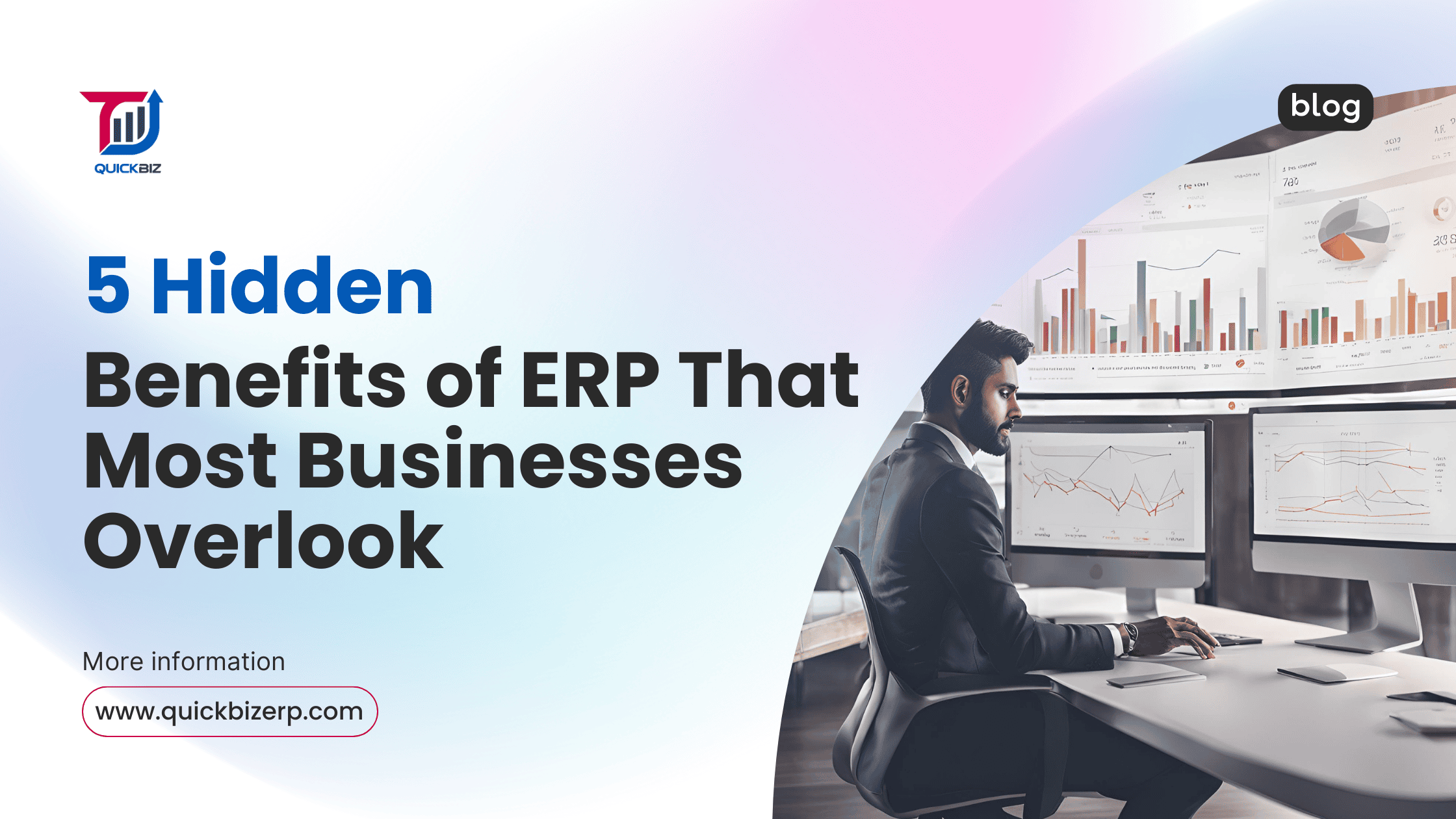5 Hidden Benefits of ERP That Most Businesses Overlook

Introduction
Enterprise Resource Planning (ERP) systems are widely recognized for their ability to streamline business operations, enhance efficiency, and reduce operational costs. However, many businesses fail to realize that ERP offers benefits that extend far beyond these commonly known advantages.
Beyond automation and cost savings, ERP solutions can significantly impact employee productivity, regulatory compliance, strategic decision-making, customer experience, and long-term cost efficiency. By overlooking these advantages, businesses may miss opportunities to optimize operations and gain a competitive edge.
In this blog, we uncover five hidden benefits of ERP that can transform the way your business operates.
1. Improved Employee Productivity
A well-implemented ERP system eliminates time-consuming manual tasks, allowing employees to focus on more valuable work. Here’s how:
- Automating repetitive tasks – Routine processes like data entry, invoice generation, and reporting are streamlined, reducing human errors and freeing up employees for strategic initiatives.
- Centralized data access – Employees no longer need to switch between multiple software applications or sift through scattered files to find the information they need. A unified ERP system ensures real-time access to critical data, improving workflow efficiency. Businesses that transition from spreadsheets to ERP experience greater clarity and efficiency.
- Enhanced collaboration – ERP connects different departments through a single integrated platform, facilitating seamless communication and teamwork. This results in improved workflow efficiency and better decision-making.
2. Streamlined Compliance and Risk Management
For businesses operating in industries with strict regulatory requirements, compliance can be a complex and time-consuming challenge. ERP solutions help by:
- Ensuring regulatory compliance – Built-in compliance tools automatically track and enforce industry standards, helping businesses stay compliant with tax laws, financial regulations, and safety guidelines.
- Automating reporting and audits – ERP reduces the risk of human errors in data entry and reporting, making audit processes more efficient and transparent. This is particularly beneficial for businesses that need real-time reporting to maintain accuracy.
- Enhancing data security – With robust security features such as role-based access, encryption, and multi-factor authentication, ERP protects sensitive business data from breaches.
3. Better Strategic Decision-Making
Making informed business decisions is crucial for long-term success, and ERP plays a key role in providing real-time insights that support strategic planning.
- Access to real-time data – ERP consolidates financial, operational, and customer data into a single source of truth, enabling leadership teams to make data-driven decisions with confidence.
- Predictive analytics and forecasting – Advanced ERP solutions leverage AI and machine learning to analyze trends, predict demand, and optimize resource allocation. Businesses looking to improve forecasting should explore emerging ERP trends.
- Customizable dashboards – Executives and managers can access visual reports and performance metrics, allowing them to quickly identify inefficiencies and opportunities for growth. A structured ERP implementation strategy ensures maximum ROI.
With enhanced visibility and accurate forecasting, businesses can adapt to market changes faster and stay ahead of competitors.
4. Enhanced Customer Experience
Customer satisfaction is a key differentiator in today’s competitive business landscape. ERP systems indirectly contribute to better customer service and engagement by:
- Speeding up order processing – With automated workflows and inventory tracking, businesses can fulfill orders faster and reduce errors, improving customer trust.
- Integrating with CRM systems – When ERP and CRM are connected, businesses gain a 360-degree view of customer interactions, allowing them to deliver personalized services and proactive support.
- Minimizing delays and disruptions – ERP ensures that supply chain processes are optimized, preventing stock shortages, shipment delays, and miscommunication between departments.
5. Cost Savings Beyond Automation
While automation is a well-known cost-saving advantage of ERP, there are other financial benefits that businesses often overlook:
- Optimized resource allocation – ERP eliminates unnecessary expenditures by providing detailed cost analysis and optimizing labor, inventory, and production planning.
- Better inventory management – Intelligent inventory tracking ensures that businesses maintain optimal stock levels, reducing overstocking and minimizing waste.
- Lower IT costs – Instead of using multiple standalone software solutions, ERP integrates all business functions into a single system, significantly cutting IT maintenance and infrastructure costs. Understanding the hidden costs of not using ERP can help businesses make more informed decisions.
Conclusion
Many businesses associate ERP with process automation and cost-cutting, but its hidden benefits can have a far-reaching impact on productivity, compliance, decision-making, customer satisfaction, and financial efficiency.
By leveraging ERP’s full potential, companies can streamline operations, gain deeper insights, and build a stronger foundation for growth.
If you’re considering an ERP solution, now is the time to explore its complete capabilities and ensure your business stays ahead in an increasingly competitive market.

